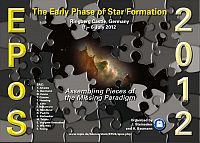›EPoS 2012 The Early Phase of Star Formation - Assembling Pieces of the Missing Paradigm
The historian of science T. Kuhn introduced the contemporary meaning of a scientific paradigm as:
- what is to be observed and scrutinized
- the kind of questions that are supposed to be asked and probed for answers in relation to this subject
- how these questions are to be structured
- how the results of scientific investigations should be interpreted
For the later phases of low-mass star formation most astrophysicists familiar with the field might agree that large parts of a paradigm have been established. However, opinions differ among the astrophysicists if this stage has been reached for the early phase of low-mass star formation as well as for the entire high-mass star formation process.
The EPoS 2012 meeting aims to identify and assemble pieces of such a paradigm.
As established in the earlier meetings, substantial time will be devoted to discussions after the presentations, at the end of each day, in the poster sessions, and in focus groups.
Both early formation of stars from the low- to the high-mass regime are considered. Individual astrophysical topics of interest are: triggered star formation, clustered star formation, cores, chemistry, collapse, fragmentation, jets, competitive accretion, giant molecular clouds, binarity, magnetic fields, initial mass function, turbulence, X-rays, and early phases of disks.
Track this event on your Apple calendar














 Germany
Germany